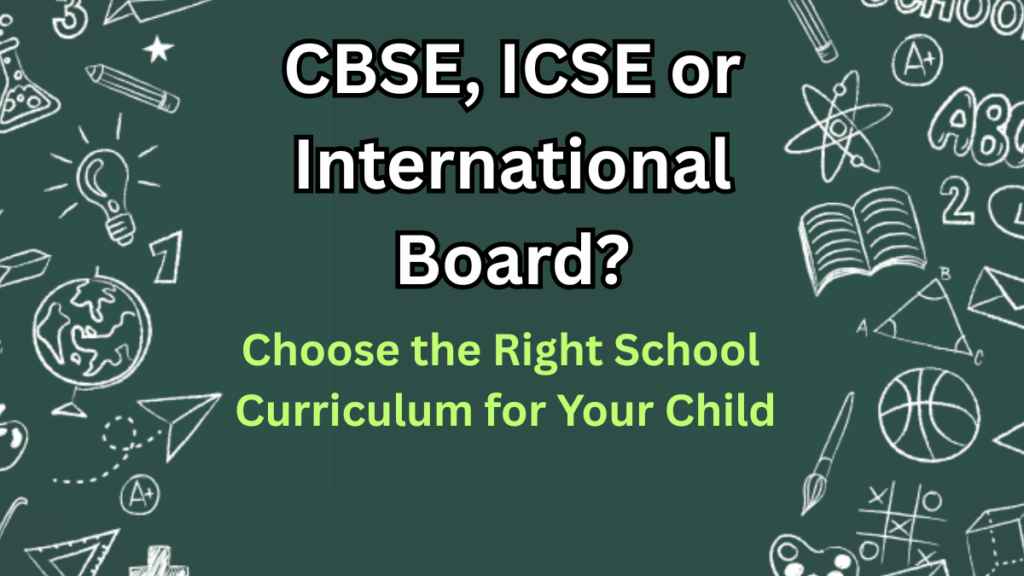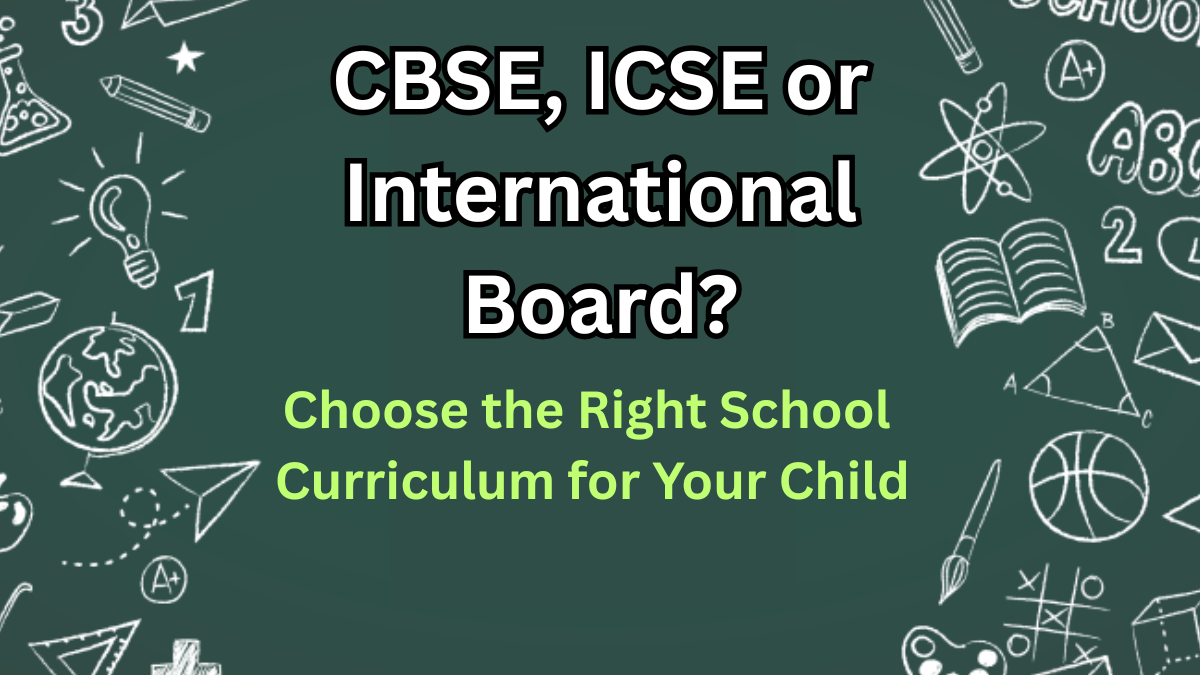As parents, one of the most crucial decisions you’ll make for your child is selecting the right school curriculum. This decision goes far beyond academics — it shapes your child’s personality, interests, future education path, and even their global opportunities.
With options like CBSE, ICSE or International boards, it can feel overwhelming. But don’t worry — we’re here to make choosing based on curriculum & board easier and clearer for you.
Let’s explore what each board offers, how they differ, and how you can find the best fit for your child.

Why Choosing the Right Curriculum is So Important
Each board sets the foundation for your child’s:
-
Academic approach and exam performance
-
Skill development and interests
-
Higher education and career path
-
Adaptability in local or international environments
Understanding the unique strengths and limitations of each board helps you make a decision aligned with your child’s needs and future plans.
CBSE vs ICSE vs International – Key Differences at a Glance
Here is a comparative overview of the three boards to help you make an informed decision:
| Feature | CBSE (Central Board) | ICSE (Indian Certificate) | International Boards (IB, IGCSE, etc.) |
|---|---|---|---|
| Curriculum Focus | National syllabus with emphasis on Science & Math | Broad syllabus with strong English & literature focus | Global curriculum designed for conceptual clarity |
| Learning Style | Exam-oriented and structured | Balanced with practical and theoretical learning | Inquiry-based and learner-centric |
| Assessment Pattern | Mostly exams, fewer internal assessments | Combines exams with practical work | Emphasis on projects, essays, internal assessments |
| Language Focus | English & Hindi | Strong focus on English | Multilingual options based on global standards |
| Global Recognition | Recognised in India, limited abroad | Limited global acceptance | Highly recognised by universities worldwide |
| Best Suited For | Students targeting Indian competitive exams | Students inclined toward languages & arts | Students planning international education or careers |
Deep Dive: Understanding Each Curriculum
CBSE – Ideal for Indian Higher Education and Competitive Exams
The Central Board of Secondary Education (CBSE) is India’s most widespread school board, aligned with national entrance exams like JEE and NEET. It is best suited for students who plan to pursue science or technical degrees within India.
Highlights:
-
Streamlined syllabus with a national focus
-
Emphasis on theoretical concepts, especially in Science and Math
-
Uniform examination structure across India
-
Strong foundation for competitive exams
Things to Consider:
-
Less focus on creative or artistic subjects
-
Not tailored for students aiming for international universities
-
Limited project-based learning
ICSE – Balanced and Language-Rich Curriculum
The Indian Certificate of Secondary Education (ICSE), governed by the CISCE board, is known for its in-depth curriculum, especially in English and the humanities. It encourages critical thinking and a balanced approach to education.
Highlights:
-
Strong foundation in English and languages
-
Equally focused on arts, science, and humanities
-
Emphasizes practical work, projects, and presentations
-
Encourages well-rounded development
Things to Consider:
-
Heavier academic workload compared to CBSE
-
Fewer schools affiliated across India
-
Not as closely aligned with Indian entrance exam syllabi
International Boards – Globally Focused and Student-Centric
International curriculums like IB (International Baccalaureate) and IGCSE (Cambridge International) are designed with a global outlook. They focus on developing a child’s curiosity, research skills, and creativity.
Highlights:
-
Widely accepted by universities across the world
-
Flexible curriculum with focus on research and analysis
-
Encourages real-world applications of knowledge
-
Promotes intercultural understanding and independent thinking
Things to Consider:
-
May be expensive due to infrastructure and teacher training
-
Not offered in all Indian cities
-
Less alignment with Indian entrance exams
How to Decide: Choosing Based on Curriculum & Board
When comparing CBSE vs ICSE vs International, don’t just go by popularity. Ask yourself these questions to determine what’s best for your child:
What are your child’s strengths and learning style?
-
Are they better with structured learning or open-ended exploration?
-
Do they enjoy Math and Science, or do they prefer languages and arts?
Where do you see your child studying after school?
-
If in India, CBSE and ICSE are strong options.
-
If abroad, international boards are typically more suitable.
What type of learning environment do you want?
-
Competitive and exam-focused? CBSE works well.
-
Balanced and well-rounded? ICSE is ideal.
-
Inquiry-driven and creative? International boards fit best.
Is the curriculum available in your preferred schools?
-
Not all boards are available in every school or city.
-
Infrastructure and teacher quality vary even within the same board.
Parenting Tips: Making the Transition Easier
No matter which board you choose, here are some ways to support your child’s educational journey:
-
Visit the campus – See the classrooms, labs, and co-curricular facilities
-
Talk to current students and teachers – Understand the teaching style
-
Check flexibility for future transitions – In case you need to switch boards
-
Stay involved – Participate in parent-teacher interactions and academic planning
Final Thoughts: There’s No One-Size-Fits-All
There’s no perfect board — only the right one for your child. The key lies in choosing based on curriculum & board that aligns with your child’s personality, interests, and future aspirations. Take time to research, reflect, and involve your child in the decision-making process. Education is not just about grades — it’s about growth.
FAQs
Q1. Which board is most accepted by international universities?
International Boards like IB and IGCSE are widely accepted across universities in the US, UK, Europe, and Australia. They are designed to meet global academic standards.
Q2. Is ICSE harder than CBSE?
ICSE is often considered more detailed and language-heavy, which can be challenging for some students. However, it also encourages creativity and independent thinking, making it rewarding for the right learners.
Q3. Can students shift from one board to another later on?
Yes, students can switch boards, especially during early school years. However, transitions between international and national boards may require academic adjustments and subject realignment.
Q4. Which board helps more with Indian competitive exams like JEE or NEET?
CBSE is better aligned with national entrance exams, as most test syllabi are based on the CBSE curriculum. Coaching institutes also follow CBSE guidelines.
Click here to learn more
